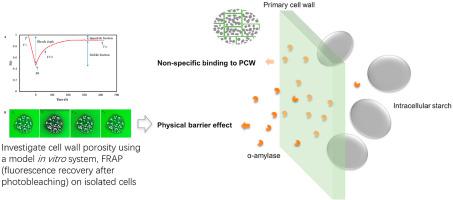Food Hydrocolloids ( IF 11.0 ) Pub Date : 2021-02-08 , DOI: 10.1016/j.foodhyd.2021.106657 Hai-Teng Li , Si-Qian Chen , Alexander T. Bui , Bin Xu , Sushil Dhital

|
Dietary fibre (DF) is increasingly being recognised as playing an important role in positive metabolic and health effects. Cell walls in the endosperm and cotyledon of plant foods are an important source of DF, and its behaviour in the digestive tract underlies the health-beneficial mechanisms. In the small intestine, the extent to which cell walls restrict enzyme access inside the intact cells largely determines macronutrient digestion followed by release and adsorption of hydrolysed micro-molecules. Porosity, a structural parameter of cell walls, controls the extent of restriction in a size-dependent manner. Plant tissues with macronutrients that are incompletely digested in the small intestine are excursed to colon and become fermentable substrates for microflora; cell walls with higher structural complexity than purified DF tend to result in more complex colonic microbiota. This mini-review summarizes the recent studies about how cell walls impact on the digestibility and fermentability of encapsulated macronutrients (especially starch). The reductionist approach using isolated individual plant cells (as a model) reveals important aspects of the nutritional functionality. Porosity is a useful parameter to evaluate the structure-function relations of plant foods.
中文翻译:

食用植物中的天然“胶囊”:细胞壁孔隙度控制淀粉的消化和发酵
膳食纤维(DF)日益被认为在积极的代谢和健康影响中起着重要的作用。植物性食物的胚乳和子叶中的细胞壁是DF的重要来源,其在消化道中的行为是有益健康的机制的基础。在小肠中,细胞壁限制完整细胞内部酶进入的程度在很大程度上决定了大量营养物质的消化,随后释放并吸附了水解的微分子。孔隙度是细胞壁的结构参数,它以尺寸依赖的方式控制约束的程度。在小肠中消化不完全的具有大量营养素的植物组织被转移到结肠,成为微生物菌群的可发酵基质。具有比纯化的DF高的结构复杂性的细胞壁往往会导致更复杂的结肠微生物群。这篇小型综述总结了有关细胞壁如何影响胶囊化大型营养素(尤其是淀粉)的消化率和发酵能力的最新研究。使用分离的单个植物细胞(作为模型)的还原论方法揭示了营养功能的重要方面。孔隙度是评估植物食品的结构-功能关系的有用参数。































 京公网安备 11010802027423号
京公网安备 11010802027423号